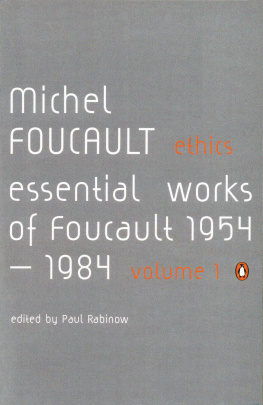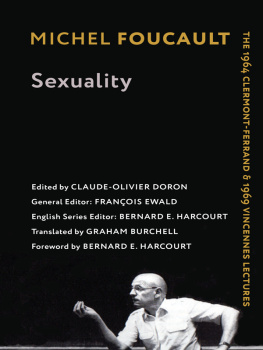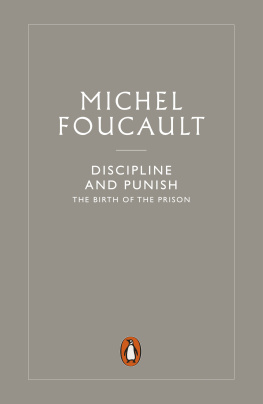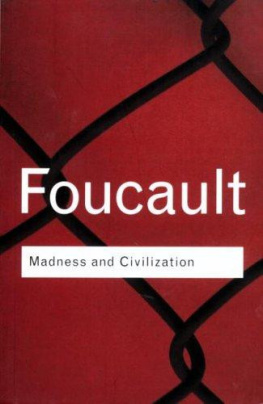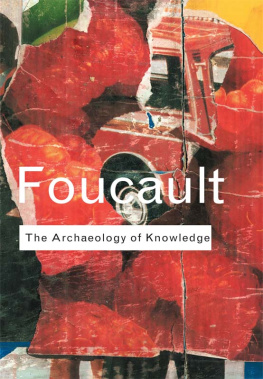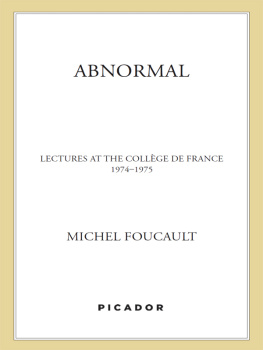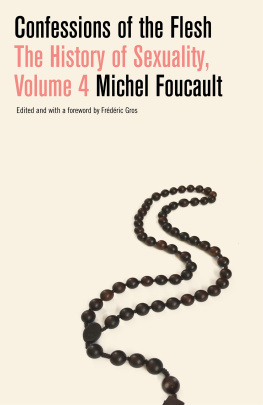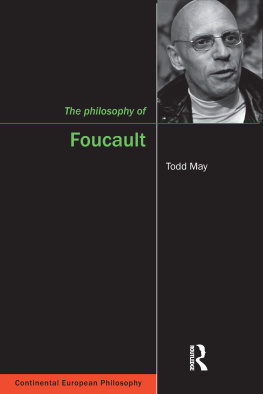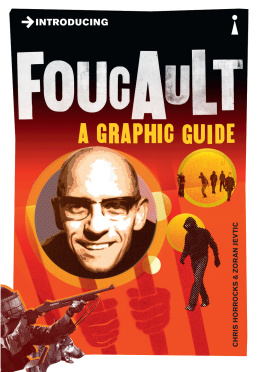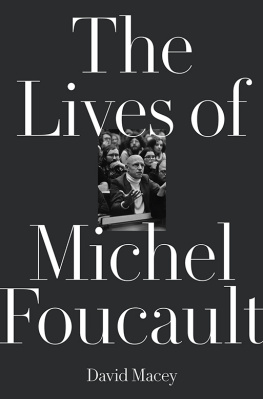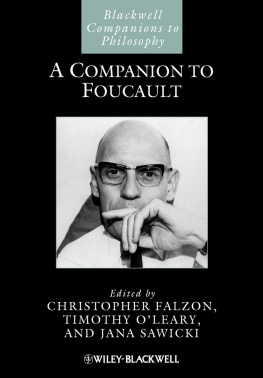Michel Foucault
ETHICS
SUBJECTIVITY AND TRUTH
Edited by
PAUL RABINOW
Translated by
ROBERT HURLEY AND OTHERS
ESSENTIAL WORKS OF
FOUCAULT
19541984
V O L U M E O N E

PENGUIN BOOKS
UK | USA | Canada | Ireland | Australia
India | New Zealand | South Africa
Penguin Books is part of the Penguin Random House group of companies whose addresses can be found at global.penguinrandomhouse.com.

Selections from Dits et crits 19541984, eds. Daniel Defert and Franois Edwald, with the assistance of Jacques Lagrange, first published by ditions Gallimard 1994
This collection first published with new translations in the United States of America by the New Press 1997
Published in Penguin Books 2000
Published in Penguin Classics 2020
Copyright ditions Gallimard, 1994
Compilation, introduction and new translations copyright the New Press, 1997
The publisher is grateful for permission to reprint the following copyrighted material: English translations of Friendship as a Way of Life and The Ethic of the Concern for the Self as a Practice of Freedom reprinted from Foucault Live: Interviews 19611984, Lotringer, (ed.) (New York: Autonomedia, 1989), by permission. English translations of Sexual Choice, Sexual Act and The Masked Philosopher reprinted from Michel Foucault: Politics, Philosophy, Culture, Lawrence D. Katzman, (ed.) (1988), by permission of the publisher, Routledge: New York and London. Sex, Power and the Politics of Identity, reprinted from the Advocate no. 400, 7 August 1984, by permission. Sexuality and Solitude reprinted from the London Review of Books, vol. III, no. 9, 21 May5 June 1981. English translation of The Battle for Chastity reprinted from Western Sexuality, Aris, Bejin (eds.), with permission from the publisher, Blackwell Publishers
The moral rights of the author and translator have been asserted
ISBN: 978-0-141-99138-2
This ebook is copyright material and must not be copied, reproduced, transferred, distributed, leased, licensed or publicly performed or used in any way except as specifically permitted in writing by the publishers, as allowed under the terms and conditions under which it was purchased or as strictly permitted by applicable copyright law. Any unauthorized distribution or use of this text may be a direct infringement of the authors and publishers rights and those responsible may be liable in law accordingly.
Series Preface
Michel Foucault provides a splendid definition of work: That which is susceptible of introducing a significant difference in the field of knowledge, at the cost of a certain difficulty for the author and the reader, with, however, the eventual recompense of a certain pleasure, that is to say of access to another figure of truth. Diverse factors shape the emergence, articulation, and circulation of a work and its effects. Foucault gave us intellectual tools to understand these phenomena. In Michel Foucaults Essential Works, we use these very tools to understand his own work. Though he intended his books to be the core of his intellectual production, he is also well known for having made strategic use of a number of genresthe book and the article to be sure, but also the lecture and the interview. Indeed, few modern thinkers have used such a wide array of forms in so skillful a fashion, making them an integral component in the development and presentation of their work. In this light, our aim in this series is to assemble a compelling and representative collection of Foucaults written and spoken words outside those included in his books.
Foucault died on June 25, 1984, at age fifty-seven, of AIDS, just days after receiving the first reviews of the second and third volumes of The History of Sexuality, in the hospital. A year previous to his death, when he was showing no signs of illness, he had written a letter indicating that he wanted no posthumous publications; through the course of complex negotiations between those legally responsible to him, intellectually engaged with him, and emotionally close to him, it was decided that this letter constituted his will. He left behind, as far as we know, no cache of unpublished texts; we must conclude, then, that his papers were in order. Ten years later, Editions Gallimard published Dits et crits, well over three thousand pages of texts, organized chronologically. The editors, Daniel Defert and Franois Ewald, sought to collect all Foucaults published texts (prefaces, introductions, presentations, interviews, articles, interventions, lectures, and so on) not included in his books. We have made a selection, eliminating overlapping or repetition of different versions of similar materials. Likewise, a number of the lectures and courses will in time be published separately in English.
What we have included in this and the following two volumes are the writings that seemed to us central to the evolution of Foucaults thought. We have organized them thematically. Selecting from this corpus was a formidable responsibility that proved to be a challenge and a pleasure. Many of these texts were previously unavailable in English. In broad lines, the organization of the series follows one proposed by Foucault himself when he wrote: My objective has been to create a history of the different modes by which, in our culture, human beings are made subjects. My work has dealt with three modes of objectification which transform human beings into subjects. or, more generally, power relations.
NOTES
Foucault, Des Travaux, in Dits et crits (Paris: Gallimard, 1994), vol. 4, p. 367.
Foucault, The Subject and Power, in Michel Foucault: Beyond Structuralism and Hermeneutics, ad ed., Hubert Dreyfus and Paul Rabinow (Chicago: University of Chicago Press, 1983), p. 208.
Idem.
Idem.
Idem.

Part One
THE COURSES
Candidacy Presentation: Collge de France, 1969
Previous Work
In the Histoire de la folie lge classique, I tried to determine what might be known about mental illness in a given epoch. A knowledge of this sort is manifested, of course, in the medical theories that name and classify the different pathological types and attempt to explain them; one also sees it appearing in phenomena of opinionin that old fear which madmen give rise to, in the operation of the credulities that surround them, in the way they are depicted in the theater or in literature. Here and there, analyses done by historians could serve me as guides. Yet one dimension appeared to be unexplored: I needed to try to discover how the mad were recognized, set apart, excluded from society, interned, and treated; what institutions were assigned to receive and hold themcare for them at times; what authorities decided about their madness, and according to what criteria; what methods were employed to constrain them, punish them, or cure them; in short, in what network of institutions and practices the madman was both enmeshed and defined. Now, this network appears very coherent and well adapted to its purpose when one looks at its functioning and the justifications it was given at the time: a whole exact and articulated knowledge was involved in it. So an object took shape for me: the knowledge invested in complex institutional systems. And a method asserted itself: instead of running through the library of scientific literature, as one was apt to do, and stopping at that, I would need to examine a collection of archives comprising official orders, statutes, hospital or prison records, court proceedings, and so on. It was at the Arsenal and the Archives Nationales that I undertook the analysis of a knowledge whose visible body is not theoretical or scientific discourse, nor literature either, but a regulated, everyday practice. The example of madness appeared to me, however, to be insufficiently topical; in the seventeenth and eighteenth centuries, psychopathology was still too rudimentary for one to be able to distinguish it from a mere elaboration of traditional opinions; it seemed to me that clinical medicine at the time of its birth posed the problem in more rigorous terms; indeed, at the beginning of the nineteenth century it was connected with constituted sciences or ones in the process of being constituted, such as biology, physiology, and pathological anatomy; but it was also connected with a set of institutions such as hospitals, welfare services, and teaching clinics, as well as with practices such as administrative surveys. I wondered how, between these two reference points, a knowledge could have come into being, transformed itself and developed, offering to scientific theory new fields of observation, fresh problems, and objects unperceived until then; but how, on the other hand, scientific knowledge [

